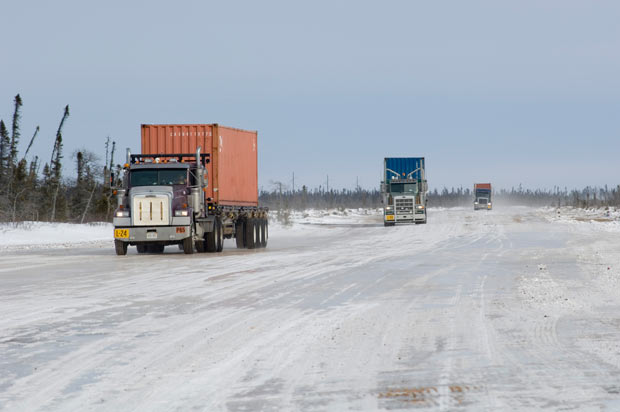
OTTAWA – Greg Rickford, Canada’s Minister of Natural Resources and Minister for the Federal Economic Development Initiative for Northern Ontario, and the Honourable Ed Fast, Minister of International Trade, today announced the Government of Canada’s Strategy for the extractive sector (including mining, oil and natural gas). The ministers made the announcement at the Mining Association of Canada’s annual Mining Day on the Hill luncheon.
The federal government is working to boost the mining and oil and gas sectors.
“Our government recognizes the importance of the mining industry to Canadian jobs and long-term economic prosperity. We’re working aggressively to attract investment and open new markets. Once again, we are demonstrating our commitment to creating the conditions that enhance Canada’s competitive position as a global mining leader,” stated Greg Rickford, Minister of Natural Resources and Minister for the Federal Economic Development Initiative for Northern Ontario.
“When the Canadian extractive sector companies succeed abroad, they create jobs, opportunities and long-term prosperity for all Canadians and their families. Our government is proud of our leadership and excellence on responsible resource development and the Extractive Sector Strategy ensures Canada’s world-class extractive sector will continue to thrive, ” stated Ed Fast, Minister of International Trade
The Extractive Sector Strategy builds on Canada’s plan for Responsible Resource Development, ensuring that mining and energy will continue to represent an engine of economic growth and prosperity for Canadians. The Canadian Extractive Sector Strategy recognizes that Canadian companies that are strong and successful abroad create jobs and opportunities throughout Canada. Moreover, Canada’s technical expertise in the extractive sector strengthens the capacity of our developing country partners to manage their resources and realize the economic and social benefits of responsible resource development.
Key elements of the Extractive Sector Strategy include:
- leveraging trade and investment agreements to provide the certainty and the predictability necessary for Canadian businesses to invest and operate abroad;
- transforming business opportunities into business successes through “economic diplomacy” and on-the-ground support;
- advocating for improved governance and regulatory frameworks abroad and sharing best practices;
- increasing training in missions abroad to support the extractive sector, complemented by embedded resources in Canada in extractive sector associations; and
- expanding stakeholder linkages to ensure the Government is responsive to the needs of the extractive sector, including developing annual market access plans for priority markets.
In addition to today’s announcement, the Government of Canada is laying the groundwork to ensure the long-term success of Canada’s mining and oil and gas sectors by keeping taxes low, eliminating red tape, and modernizing the regulatory regime for major projects. The Government of Canada is also investing in public geoscience programs such as the Geo-Mapping for Energy and Minerals (GEM) and the Targeted Geoscience Initiative (TGI) to secure the long-term prosperity of mining communities and industry by ensuring informed land-use and resource investment decisions.
Today’s announcement also complements the enhanced Corporate Social Responsibility (CSR) Strategy for Canada’s extractive sector abroad, Doing Business the Canadian Way. The Extractive Sector Strategy delivers on the commitment under Canada’s Global Markets Action Plan to further the interest of Canadian companies abroad.
Finally, since 2006, the Government has signed, concluded, or brought into force a record number of 24 Foreign Investment Promotion and Protection Agreements, known as FIPAs, to protect Canadian companies that are making job-creating investments in foreign markets.
Quick Facts
- Canada is one of the largest mining nations in the world, producing more than 60 minerals and metals.
- Canada has the world’s third-largest proven oil reserves at 173 billion barrels.
- Canada is the fifth-largest producer of natural gas in the world with recoverable resources estimated at up to 44 trillion cubic metres — enough for over 300 years at current production.
- Canada’s extractive sector — oil, natural gas and mining — generated $174 billion of exports in 2013, accounting for over 39 percent of the total value of Canadian domestic exports.
- These sectors account for 13 percent of GDP and more than 380,000 jobs.
- Between 2008 and 2012, the mining and minerals and metals processing sectors have contributed annually, on average, $4 billion in corporate taxes and royalties.
- In Economic Action Plan 2013, the Government of Canada committed $100 million over seven years to renew the Geo-Mapping for Energy and Minerals program to significantly advance and modernize geological knowledge in the North.
- The Targeted Geoscience Initiative is a $25-million, five-year (2010–2015) collaborative federal geoscience program that provides industry with the next generation of geoscience knowledge and innovative techniques to better detect buried mineral deposits, thereby reducing some of the risks of mineral exploration.
Extractive Industries: The Canadian Advantage at Home and Abroad
Canada’s oil and gas and mining companies are key drivers of the Canadian and global economies.
With interests in more than 8,000 properties, both in Canada and in over 100 countries abroad, Canadian companies in mining and mineral exploration alone account for almost half the world’s activities in this sector. These companies, many of which are small- and medium-sized enterprises, have built a world-renowned reputation based on Canadian know-how in exploration, engineering, extraction, development and financial management. When extractive resources are developed and managed in an economically, socially and environmentally responsible manner, job creation is facilitated and sustainable economic growth can occur in countries and communities where they are operating.
Within this context, resource-rich countries are increasingly seeking to learn from Canada’s best practices in the development and management of their extractive sector, as they look to capture the potential of their own natural resource endowments. The Canadian Extractive Sector Strategy articulates a strong vision for Canada’s response to these countries by bringing to bear a broad range of commercial, diplomatic and development efforts.
The extractive sector, which includes oil and gas and mining companies, generated $174 billion in exports for Canada in 2013, accounting for over 39 percent of total domestic exports. In the mining sector alone, nearly 3,200 suppliers of equipment and services support the industry
.As well as creating jobs and growth today in Canada and around the world, Canada’s extractive sector is also making a large contribution to this country’s long-term economic security. In the case of mining (including some downstream activities), payments to Canadian governments (federal and provincial) in the form of taxes and royalties totalled $18.9 billion from 2008–2012. The mining sector’s economic footprint also extends to the financial sector. Specifically, from 2008 to 2012, 39 percent of global mining equity and over 70 percent of all global mining equity financings were handled through the Toronto Stock Exchange and the TSX Venture Exchange — more than through any other stock exchange in the world. The mining sector’s financial strength helps to sustain private pension funds and the Canada Pension Plan.
The Canadian Extractive Sector Strategy sets out a framework to ensure greater coherence and more effective implementation of efforts to advance the interests and opportunities for Canada’s extractive sector abroad. Guided by stakeholder consultations undertaken in 2013 and informed by the enhanced Corporate Social Responsibility (CSR) Strategy for Canada’s Extractive Sector Abroad: Doing Business the Canadian Way, the Canadian Extractive Sector Strategy coordinates efforts, including through support provided by the government of Canada’s “economic diplomacy,” to help generate business success and fuel prosperity for Canadians as well as host governments and local communities abroad. The four pillars of the Canadian Extractive Sector Strategy, as well as highlights of each pillar, are set out below.
1. Securing and preserving access to international markets for Canadian business including by:
- reinforcing the commitments of the Global Markets Action Plan to advance trade and investment agreements, especially Foreign Investment and Protection and Promotion Agreements (FIPA) to provide companies in the extractive sector the confidence they need to invest and conduct their operations;
- advocating for an improved environment for responsible business activity in the extractive sector abroad, including through international bodies such as the G7/G20, and via bilateral partnerships with resource-rich countries; and,
- leveraging domestic policies and programs in support of the Canadian extractive sector abroad, such as the Global Opportunities for Associations program to help Canadian organizations and companies create new business opportunities in key financial, technical and industrial sectors.
- Providing the on-the-ground support of the Government of Canada through its economic diplomacy to leverage opportunities abroad;
- positioning Canada as a partner of choice and an attractive destination for foreign direct investment, and facilitating an expansion of investment by Canadian extractive sector companies abroad;
- branding and promoting Canada and Canadian extractive companies leadership and excellence in responsible resource management through the Responsible Resource Development Initiative, both at home and abroad; and
- increasing training for Canadian Trade Commissioner Service officers in the extractive sector so that they can continue to deliver targeted and sustained assistance to facilitate increased commercial opportunities for Canadian companies.
- working with host governments to enhance their capacity to manage the development of their own natural resources for economic, social and environmental sustainability, thereby helping to reduce poverty;
- promoting transparency and accountability in the international extractive sector;
- growing businesses and improving local economic development through economic diversification and local value creation;
- enabling communities to maximize benefits from the extractive sector to promote inclusive growth and community empowerment, including training and skills development;
- improving resource governance in resource-rich countries to create a more predictable and stable business and investment environment for Canadian companies; and,
- building on the enhanced CSR Strategy to strengthen and focus Government of Canada efforts to help extractive companies incorporate CSR into their practices. Incorporating CSR and reflecting Canadian values, better positions Canadian companies to succeed and reinforces Canadian leadership and excellence in responsible business practices.
- promoting the global leadership and expertise of the Canadian extractive sector so that Canadian-based supply and service firms supporting domestic oil and gas and mining companies can also succeed in international markets;
- supporting the extractive sector so it can be an engine for value-added jobs in research and development and for increased Canadian investment in innovation; and,
- continuing to support a productive Canadian extractive supply chain, with a focus on small and medium-size enterprises.
In addition to the CSR Strategy and the Canadian Extractive Sector Strategy, other government initiatives to foster leadership in social, environmental and economic performance by the extractive sector include:
- the Extractive Sector Transparency Measures Act which will require companies to report specific payments made to any level of government in Canada or abroad;
- initiatives to improve natural resource governance in developing countries so they can maximize the economic and social benefits from oil, gas and mining development, including the Extractive Industries Transparency Initiative (EITI) and the Intergovernmental Forum on Mining, Minerals and Metals and Sustainable Development; and
- creation of the Canadian International Resources and Development Institute, (formerly the Canadian International Institute for Extractive Industries and Development), which aims to help developing countries build their natural resource management strategies to maximize the benefits of natural resources for their citizens.







